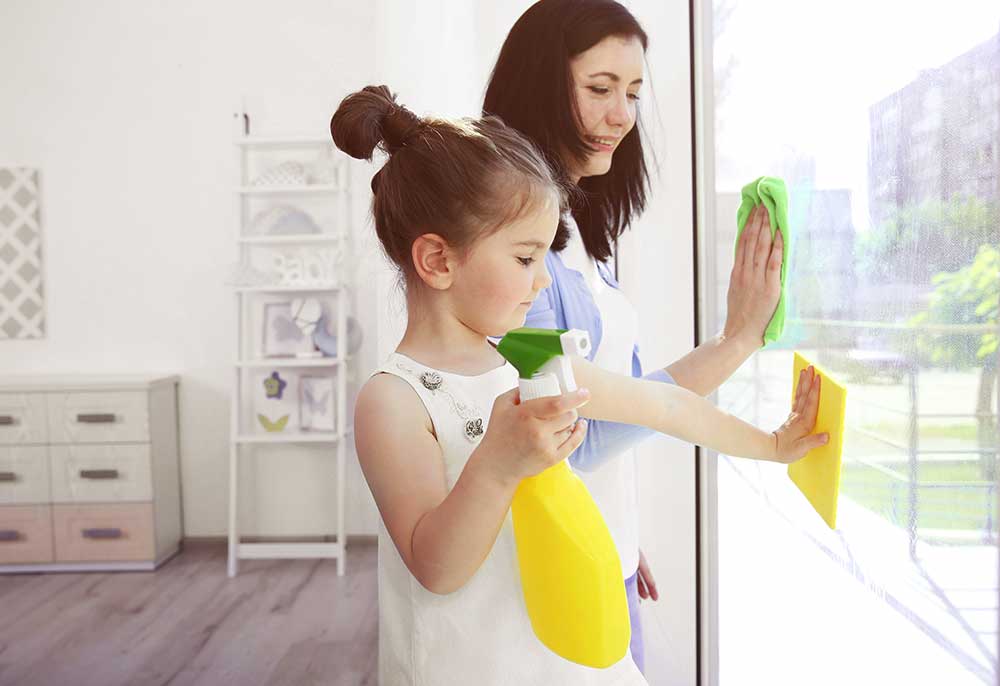Parents sometimes question whether or not they should assign duties to their children. After all, isn't it the parents' job to keep the house in order? And don't kids deserve a chance to 'just be kids' for a while because they'll have to worry about chores for the rest of their lives?
The majority of children have extremely hectic schedules as well. They scurry from one activity to the next, leaving little time to tidy or mow the yard. Regardless of your reservations, assigning duties to your child may be one of the most important things you'll ever do.
Kids who help with chores acquire responsibility and valuable life skills that will benefit them for the rest of their lives.
While delegating jobs to your children helps relieve some of your stress, it's not the only reason you should expect them to help around the house. Chores have been shown to be beneficial to youngsters in studies.
A 75-year Harvard study looked at the psychosocial characteristics and biological processes in childhood that predicted health and well-being later in life. Researchers discovered that children who were given chores did better later in life.
Why is it so necessary for children's well-being to sweep the floor and clear the table? One reason is because when children complete their responsibilities, they feel capable. Helping around the house, whether it's making their bed or cleaning the floor, makes children feel capable.
Chores also make children feel like they are a part of the team. Helping family members is beneficial to them and helps them to be decent citizens.
Here is an age-wise gap of chores that your girl child should be acquainted with.

Pre-schoolers (ages two to four)
Some of this age group's living skills will be self-sufficient, but others will require your help or supervision. However, it is necessary to teach them so that your children can continue to improve as they grow older.
• Cleaning Up: Make use of your child's sorting and recognising skills. After they've finished playing, ask them to place their toys in the right boxes, sort their books on the shelf by colour, or line up their stuffed animals on their bed by size. You can even enlist their assistance in sorting the laundry.
• Emergency Numbers: Teach them how to dial the important emergency numbers and how to dial your home and/or cell phone numbers. Examine their ability to recall their street address, town, and state. You want to make sure kids know how to contact close family or friends in the event of an emergency. Keep a list of numbers in a visible location and have them practise with you.
• Picking Out Their Outfits: Learning how to dress appropriately entails checking the weather forecast and discussing the day's activities, which is a terrific opportunity to incorporate some morning circle time. If your children have returned to school, have them lay their clothing out the night before. This establishes a consistent pattern, saves time in the morning, and teaches kids how to be prepared.
• Setting The Dinner Table: Are you looking for a simple approach to introduce numbers, counting, and symmetry to your students? Look no farther than a table setting, which allows you to practise spatial and procedural memorisation while also allowing you to lay out matching sets of cutlery, plates, and cups. Allow kids to add a few personal touches to the table, such as handcrafted place cards or small photos for each family member. They will be pleased with their labour and eagerly anticipate dinner.

Little Kids (ages five to seven)
It is very crucial to empower children at this age. Structure and basic chores will help children feel more in control of their lives and situations.
• Basic Cleaning: Ask your child to help sort the trash and recycling, in addition to washing down sinks and light vacuuming. Learning which products are recyclable leads to fruitful discussions on climate change, environmental stewardship, and trash reduction. Furthermore, your children may become enthralled by the prospect of finding recyclable items and making environmentally conscious selections.
• Prep And Sort Laundry: Teach children how to distinguish between light and dark colours. Request that they empty their pockets before putting anything in the washer, and explain why one red sock can turn an entire load of whites pink.
• Making The Bed: This skill is frequently missed in the rush to get out the door in the morning. But, it has a huge impact on how your day goes. You may even establish a morning routine that includes making the bed as part of your daily preparations. Regularly including this job into their daily routine creates a lifelong habit that will benefit them for the rest of their lives.
• Cooking Skills: Stirring, mixing, shaking, and whisking are all popular activities among children. Making peanut butter and jelly sandwiches, cracking eggs, and using the blender (with supervision) are places where you can begin. Look for methods to involve your children in the preparation of meals. Also, consider allowing children to help you prepare meals for the week.

Older Kids (ages eight to 10)
Most kid-friendly jobs can be handled by children in this age bracket.
They can also begin to take on some of the chores you didn't feel comfortable entrusting them with when they were six or seven, such as cooking on a hot stove, if you believe they have good judgement and safety awareness.
• Intermediate Cooking: At this age, you should be able to teach your children to scramble eggs, boil water for pasta, and prepare pancakes. Set out measuring cups and invite them to double, triple, or even quadruple an easy dish to teach children fractions. Allow your children to prepare a family meal if they are exceptionally adept or interested at this age (with your supervision, of course).
• Gardening: This is one of the most effective ways to combine science and life skills. For example, discuss how much sunlight tomato plants require to grow. You could even bring up the topic of photosynthesis. Also, discuss the many types of soil and what is ideal for plant growth.
• Using Common Tools: Most instruments, such as hammers, screwdrivers, and wrenches, necessitate muscular coordination. Angles, force, momentum, and speed are all required, but they also require some arithmetic or physical science. Look for ways for your children to assist you around the house by using tools. For example, have them tighten the screws on the bathroom towel rack or assist in the hanging of a framed photo in their room.
• Loading Dishwasher: To fill a dishwasher, you'll need some spatial knowledge, believe it or not, so that everything fits and gets cleaned. Tell your kids it's like a game of Tetris. Making the work of filling (and emptying) the dishwasher a daily activity also teaches children the value of contributing to the household's efficiency.

Tweens And Teens (age 11 and up)
Teens should focus on the life skills they will need to live independently one day, such as managing a bank account and conducting basic household maintenance, while tweens should learn how to be responsible for their time, money, and personal cleanliness.
• Managing Money: This is plainly math, and while it's critical to educate your children how to manage their money (whether it comes from an allowance, presents, or a part-time job), they also need to be aware of a number of other abilities. Calculating interest payments on credit cards and loans, comparing costs on purchases, creating a budget, and submitting a tax return are all examples of this. You may even set aside a certain amount of money for them to spend each month and encourage them to make a budget for it.
• Household Maintenance: Is your teen capable of changing a light bulb? How do you unclog a drain? Do you want to mow the lawn? It's time for them to learn if they haven't already. Your children will need these basic abilities while they are in college or working and live in a dorm or apartment. There is no better time than now to study them. Also, make sure they're helping out with household responsibilities like cleaning.
• Personal Responsibilities: There's a lot to consider here, but older kids should grow used to making phone calls, scheduling appointments, ordering food, meal planning, and budgeting their own time. Learning these skills today will teach them the value of taking care of their body and practising preventative health care in the future.
• Personal Hygiene: If you're still nagging your teenagers to shower, wear deodorant, and take care of their skin, it's time for them to take control of personal hygiene. Allow them to choose their own products, shower at their leisure (AM or PM), and keep their own hairstyle or style. Giving kids some autonomy in this area will help to motivate them.
Also Watch: First Attempt Series: Changing A Light Bulb
Also Read: The 10 Basic Principles Of Good Parenting